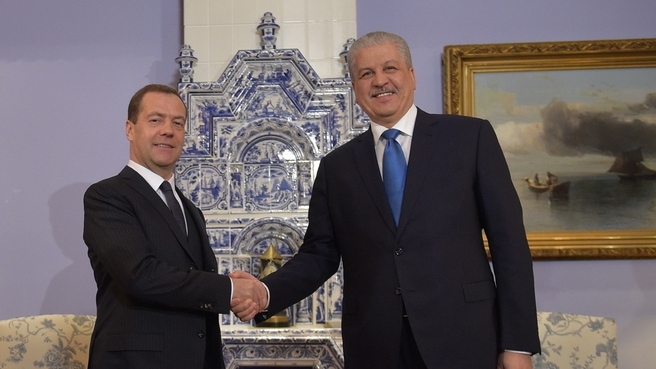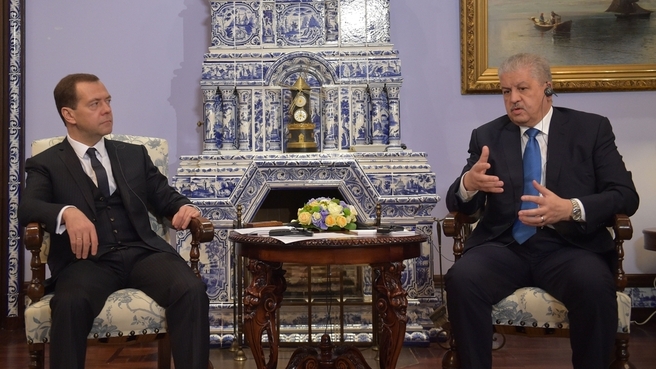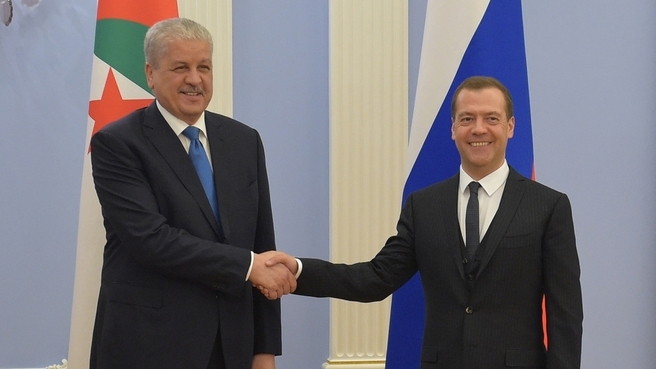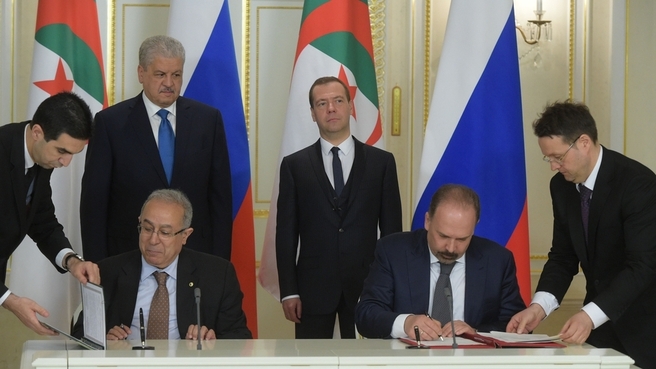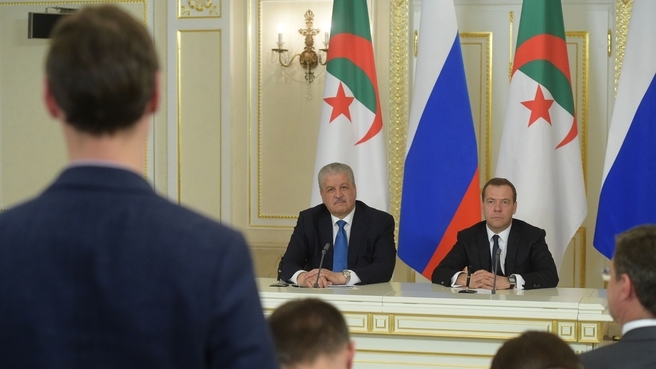Dmitry Medvedev held talks with Prime Minister of Algeria Abdelmalek Sellal.
Dmitry Medvedev’s meeting with Prime Minister of Algeria Abdelmalek Sellal
Documents signed following the talks
Dmitry Medvedev’s and Abdelmalek Sellal’s statements for the media after Russia-Algeria talks
Dmitry Medvedev’s meeting with Prime Minister of Algeria Abdelmalek Sellal
Transcript:
Dmitry Medvedev’s meeting with Prime Minister of Algeria Abdelmalek Sellal
Dmitry Medvedev: Mr Prime Minister,it gives me great pleasure to welcome you [to Moscow]! I am pleased to have the opportunity to meet with you and address the wide-ranging relations that have evolved between Algeria and Russia. These relations have been developing steadily, at least over the past few years. I recall my visit to your country in 2010; it was also marked by a number of notable events in our relations.
At present, our ties are on the rise, as is evidenced by the large volume of our trade contacts. Our aggregate turnover is growing, even despite all kinds of difficulties that the global economy is experiencing and that our economies always confront. The figures are good: about $2 billion last year and this year, too, began with good indicators.
We have a variety of economic areas in which we cooperate, from energy, metallurgy and the manufacturing industry to other areas that are of mutual interest, including sensitive areas which have given us reason to always be in contact. I propose discussing all of them today.
I hope that as a result of your talks with the Russian Government and our other colleagues and heads of the legislative branch, you will be able to get the full picture of how things are going here. Naturally, we will also exchange views on the international situation, including in the Middle East and North Africa, where there are also plenty of problems and where it is extremely important to maintain peace and counter existing threats.
Again, Mr Prime Minister, welcome and I hope you enjoy your stay in Russia.
Abdelmalek Sellal (via interpreter): First of all, allow me to thank you for your invitation and the warm welcome that has been accorded me and our entire delegation in Moscow. I was very pleased to meet you and members of the Government. We have also met with representatives of business circles in Russia. As you know, our presidents signed a strategic partnership agreement long ago. We have economic agreements and, as you pointed out, we have strong relations.
The Algerian delegation has made this journey in order to show that we want to move further and strengthen our ties with Russia. We have lived through two economic upheavals. As you know, the situation is changing and there are certain difficulties in the global economy. Algeria has decided to change its economic system somewhat to become genuinely independent in all areas.
We believe it is necessary to deal with the issue of oil prices. To get rid of this tool of economic pressure we need to resolve this issue.
Two years ago, we decided to organise production so as to improve the country’s economic situation and diversify our economy as there is huge potential for this, including in agriculture. In southern Algeria, we harvest several crops [a year] and in the north we have a vibrant agriculture economy. We have certain partnership plans for Russian and Algerian enterprises to stimulate our cooperation. There are plenty of examples to this effect.
We have long-standing industrial cooperation programmes. Over the past two years we have been helping Algerian companies, mainly state-owned ones, because we have changed our economy somewhat. We have more state-controlled enterprises now. However, our private economic sector is also raising its profile and this will allow us to promote effective cooperation, effective partnership in agriculture and in industry.
We have considerable mineral reserves. We explored them back in the Soviet days but we did not develop them. Gazprom has plans to bolster cooperation with us. We are even considering shale gas development projects. Algeria is the second or third largest country [in the world] in terms of shale gas reserves and we can really find an opportunity for partnership in this area.
We are prepared for cooperation, for partnership in various areas. Today, representatives of over 200 Algerian companies have come here to participate in the forum hoping to establish stable and lasting ties with Russian companies. We in Algeria believe that Russia has always been one of our truest friends.
Algeria has always complied with an honoured its obligations. We have fundamental principles of cooperation. We are a peaceful nation and always strive to avoid conflict.
<…>
Documents signed following the talks
The following documents were signed following the talks in the presence of Dmitry Medvedev and Abdelmalek Sellal:
Memorandum of understanding on construction between the Ministry of Construction, Housing and Utilities of Russia and the Ministry of Housing and Urban Development of Algeria
Signatories:
Mikhail Men, Minister of Construction, Housing and Utilities of Russia
Ramtane Lamamra, Minister of State and Minister for Foreign Affairs and International Cooperation of Algeria
Programme of Cultural Cooperation for 2016-2018 between the Ministry of Culture of Russia and the Ministry of Culture of Algeria
Signatories:
Vladimir Medinsky, Minister of Culture of Russia
Ramtane Lamamra, Minister of State and Minister for Foreign Affairs and International Cooperation of Algeria
Memorandum of understanding on the peaceful uses of nuclear energy between the Rosatom State Nuclear Energy Corporation and the Atomic Energy Commission of Algeria
Signatories:
Sergei Kiriyenko, Director General of the Rosatom State Nuclear Energy Corporation
Mohamed Derdour, Chairman of the Atomic Energy Commission of Algeria
Memorandum of understanding between the Foundation for Development of the New Technologies Development and Commercialisation Centre (Russia) and the National Agency for the Promotion and Development of Technology Parks (Algeria)
Signatories:
Viktor Vekselberg, Skolkovo Foundation President
Abdelhakim Bensaoula, Acting Director General of the National Agency for the Promotion and Development of Technology Parks
Agreement on cooperation between the Federal State Unitary Enterprise Rossiya Segodnya International Information Agency and Algerian state information agency Algeria Press Service
Signatories:
Oleg Osipov, First Deputy Editor-in-Chief of Rossiya Segodnya
Abdelhamid Kacha, Director General of Algeria Press Service
Dmitry Medvedev’s and Abdelmalek Sellal’s statements for the media after Russia-Algeria talks
Transcript:
Dmitry Medvedev: I’d like to say a few words for members of the media. Algeria Prime Minister Abdelmalek Sellal and I have just completed our talks. Our discussion was a good, substantive exchange of opinions on all issues of Russia-Algeria cooperation. It was the first visit by the Algerian head of government to our country, at least in the post-Soviet period. I’m sure this is a good beginning, considering the dynamics of our relations.
Algeria is one of our leading economic partners in northern Africa and in the Arab world and simply our long-standing and reliable friend. Our cooperation is decades long. We have carried out major projects in industry, energy, metallurgy, mining, machine engineering and the water industry. In the past, Russia trained professional personnel for Algeria and it still does today. We believe all of this is very important and are determined to develop this cooperation further.
In the past few years, our trade and economic ties have strengthened and we greatly value this, the volume having grown several fold. In 2015, it was near $2 billion. In the first several months of this year (first quarter), our trade turnover also grew. Our major companies are present on the Algerian market and are involved in developing hydrocarbons: Gazprom, Rosneft and Stroitransgaz. We are prepared to move further in this area.
There are also new sectors for cooperation, which are also very important. These are such high-tech sectors as pharmaceuticals, telecoms and shipbuilding. And, of course, we are counting on developing our cooperation in nuclear engineering due to its promising future. Russia has unique technology and excellent expertise in the field. If our Algerian friends choose to develop this sector we are prepared to provide them all the necessary assistance.
It’s a good thing that this time the Algerian delegation includes not only members of the government but also business people. Business people promote a vital environment for the development of most different contacts. Let’s hope that this visit, which comes during a major business forum, with over 200 business people from Algeria in attendance, will help strengthen business ties, not only between large but also small and medium-sized companies.
Naturally, we have also addressed the most challenging international issues related to the situation in the Middle East and North Africa. It should be noted that our countries have similar approaches towards many regional issues.
I’d like once again to thank my colleague for his constructive approach and the good intentions that were expressed during these talks. I’m sure that the further strengthening of Russia-Algeria ties will facilitate the development of relations between our states and will be in the interests of our nations.
Abdelmalek Sellal (via interpreter): I thank my colleague and friend, Prime Minister Dmitry Medvedev, for extending his kind invitation to me and my delegation to visit Russia. My delegation includes not only representatives of government circles but also business people. Our visit today was crowned with our making a number of important decisions. We believe that this is a new chance to qualitatively strengthen our bilateral relations. I’d like to note that relations between Russia and Algeria are of a lasting historical nature. In April 2001, during President Abdelaziz Bouteflika’s visit to Russia, they were capped with the signing of a bilateral strategic partnership declaration.
During today’s visit, a number of agreements were signed in various sectors, not only between representatives of official circles but also between business people. We believe that this visit has become the next step in the strengthening of our bilateral economic partnership. We act on the premise that both sides have the desire to strengthen these relations further even though they are very strong as they are. Russia is Algeria’s friend and Algeria believes in the further development of relations with your country.
Today, a number of decisions were made concerning bilateral economic relations. During a prolonged and intensive dialogue between the two delegations, we made a number of decisions to facilitate economic collaboration, provide new opportunities and diversify our economic partnership on Algeria’s part, as well as on the part of Russian companies operating in Algeria. We are determined to support the development of bilateral economic ties in the future.
Regarding political and security issues, naturally, we discussed the situation in the Middle East and regional security issues. During our talks we noted that on the majority of political and security issues we share a similar vision as we do regarding their solutions. I’m referring primarily to the situation in the countries of the Sahel, the Maghreb and the Arab world.
We agreed on the need to continue bilateral consultations on the aforementioned problems, especially on security, both internal and international. As I said, we agreed that we have similar positions on the majority of these issues. Algeria firmly believes in the right of peoples to self-determination and during our talks we agreed that all problems, any problem in the region, any crisis in the region should be resolved by peaceful means, by prioritising justice and respect for international law.
In closing, I’d like to thank my colleague and friend on my own behalf and on behalf of my delegation. We are very pleased with our visit to our friend Russia. Thank you very much.
Question (via interpreter): A question for the Algerian head of government, the prime minister. What is your view of the present status of relations between Algeria and Moscow and what is Russia’s place in Algerian politics?
Abdelmalek Sellal (via interpreter): Thank you very much. First of all, I’d like to point out that Russia-Algeria relations are of a long-standing historical nature. They began as soon as Algeria acquired its independence and they continue to date in a large number of areas. Politically, I’d like to note that right from the start, we had similar positions on most issues, since both our countries believe in peace and in the peaceful resolution of various problems.
Regarding other aspects of our relations, we believe that despite the fact that economic ties are developing, the time has come now to give them new impulse, a second wind. Therefore, we’d like to state today that Algeria is opening its market to Russian companies, for partnership with Russian companies. I’m primarily referring to Russian companies that are already present on our market through national companies that have been established in Algeria. The fact that a large number of Algerian business people are present here today, as well as the fact that we have signed a number of important agreements, all of this shows that we’re moving in the right direction and we’ve decided to continue along this path in the future, as we need Russia and Russia could become a promising market for Algeria.
Question: Andrei Biryukov, Bloomberg. I have a question about the oil market. As we know, oil producing countries have not reached an agreement on freezing oil production. Did you discuss this issue today? How close are Algeria and Russia on this issue? What is the probability of reaching an agreement by June or at the OPEC summit in June?
Dmitry Medvedev: Since we are talking about oil and possibly also about gas, both of which concern Russia and Algeria alike, your question is addressed to both of us, as I see it. I can tell you about Russia’s position. Of course, the results of the Doha discussions are not heartening, to put it mildly, because the framework agreements we hoped to formalise have not materialised because of the participating countries’ different attitudes to the existing problems. But we are not dramatising the situation. Why? Because, first, there are fundamental reasons affecting the oil market by pushing oil prices up or down. My Algerian colleague has come to Russia at a time when Brent crude increased to $47. This could be the result of his visit to Russia.
Joking aside, I am convinced that neither Russia nor Algeria is interested in serious fluctuations in the price of oil. In fact, this is also the main thing for all large oil and gas exporters. We don’t want prices to be super-high. We need oil prices to be stable, to cover the oil companies’ expenses, of course, to make these companies’ operations profitable and, consequently, to bring revenues to national economies. This is the kind of stable pricing both producers and consumers need.
Abdelmalek Sellal (via interpreter): Algeria is certainly concerned about oil prices, but we noticed long ago that the oil market is volatile, with oil prices growing one year and falling the next year. Most oil producing countries have become accustomed to this and Algeria is no exception. It is a fact that oil accounts for about 50 percent of our revenues, and hence we have accumulated reserves for the event of such fluctuations and their negative consequences.
Regarding the failure of the Doha conference and OPEC’s position, which cannot be unified because there is no understanding between its members, we believe that the problem is rooted in overproduction.
As I said, indeed, there is a surplus of oil and this is having a negative impact on the price per barrel. We are gradually beginning to see slight changes for the better in terms of price. However, we are sure that, with help from the Almighty, these improvements will continue to develop. Of course, the price is not expected to reach $100 per barrel, as before, but I’d like to note that it is very important that investment in oil production is now falling. Major companies are reducing their investment and naturally, this will eventually lead to a fall in production. This is very important for us. However, I would also like to point out that as a result of these developments, Algeria is seeking to diversify its economy so that it is based not only on oil production, but primarily on industrial and agricultural development, as we cannot tolerate this situation, where our country is completely dependent on oil revenues, anymore.
Question (via interpreter): My question is for both prime ministers and it concerns the international situation. Did you discuss Libya, Syria and Western Sahara? The issue has still not been resolved. In this context, what kind of coordination is there between your countries’ diplomatic agencies to resolve these issues?
Dmitry Medvedev: Yes, naturally, these issues were discussed, simply because they are relevant not only for our two states, Russia and Algeria, but for the entire international community, as the general political climate depends on the resolution of these problems, at least those you have mentioned.
My colleague and I have just said that we have similar positions on the way events are unfolding, also bearing in mind the causes, the root causes of these events and their implications. Our countries’ foreign policy agencies traditionally coordinate their positions on the most important issues during discussions at the UN Security Council and other international organisations, so we will continue to work in this context.
Regarding what is going on in Syria, Libya and Western Sahara, our views are well-known. I will not repeat them or our proposals on ways to resolve the situation. The only thing to which I should probably draw your attention to is that there are no simple solutions in all these conflicts, but there is a need, by using comprehensive approaches, relying on international institutions and invoking international law, to seek agreement, use all kinds of compromise solutions to achieve agreements and ultimately rely on the will of the people who live in these countries.
Question: Good afternoon, Interfax news agency. Mr Medvedev, you have mentioned such an aspect of cooperation as cooperation in the nuclear sphere and stated that Russia is prepared to provide assistance to Algeria in developing this sector. In this context, here is a question for both prime ministers. Could you speak in greater detail about plans to develop Algeria’s nuclear engineering and how can Russia play a part in this?
Dmitry Medvedev: Algeria’s plans for developing its nuclear engineering sector depend on Algeria itself, on its intentions, its desire and, finally, its financial capabilities. However, it is perfectly obvious that nuclear engineering and peaceful uses of atomic energy in general is a highly promising area. Despite the fact that there are always stringent standards for the safety of nuclear installations, nuclear engineering is developing across the world. Russia, indeed, has sound capabilities for such projects. We are carrying them out all over the world. We probably have the largest portfolio of orders, secured by our state corporation Rosatom. So, if our partners are prepared to develop their nuclear engineering sector, we will naturally be pleased to help them, if they choose us. To reiterate, we have excellent capabilities and expertise and our specialists are highly professional. We are prepared to provide assistance in training such specialists for our Algerian friends. If the decision is made to build a nuclear power plant and we are invited to help (to reiterate, this depends on our Algerian partners), we will be pleased to do this.
Abdelmalek Sellal (via interpreter): I’d like to add just two or three remarks to the positive response that my colleague Dmitry Medvedev has provided. Indeed, we have discussed cooperation in terms of the peaceful uses of nuclear energy and we have a relevant agreement between our two countries. At present, our country is pursuing the policy of energy source diversification. As is well known, we are oil and gas producers, but new trends are dictating the need to diversify energy sources, peaceful nuclear engineering being one of them. Naturally, we are training our personnel and Russia is helping us with regard to the peaceful uses of atomic energy. At present, this could be related to such an aspect of civilian nuclear engineering as the use of this technology in healthcare. However, naturally, we are sticking to our policy in the future. We believe that a certain framework will need to be created to move forward along these lines, including in cooperation with Russia.
(Speaks Russian) Thank you. Goodbye.
